Main Event WSOP 2000 – 2008 Champions: Where Are They Now?
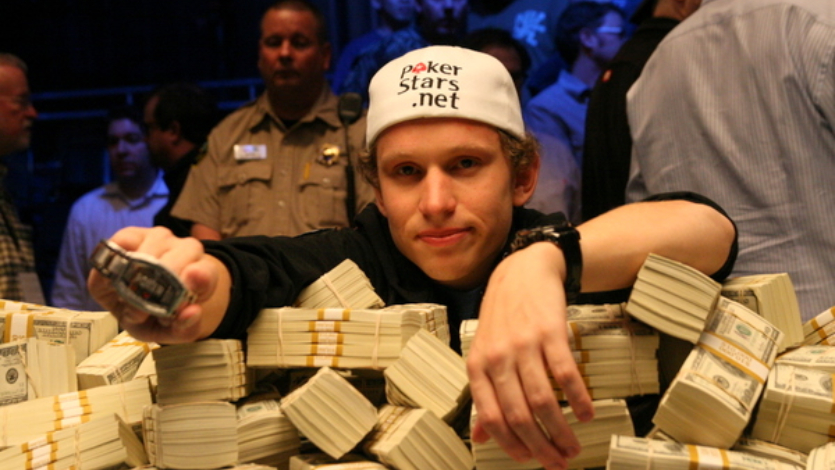
In anticipation of the start of the World Series of Poker, we recall the main event WSOP champions and tell the story of how their destinies unfolded.
2000: Chris Ferguson
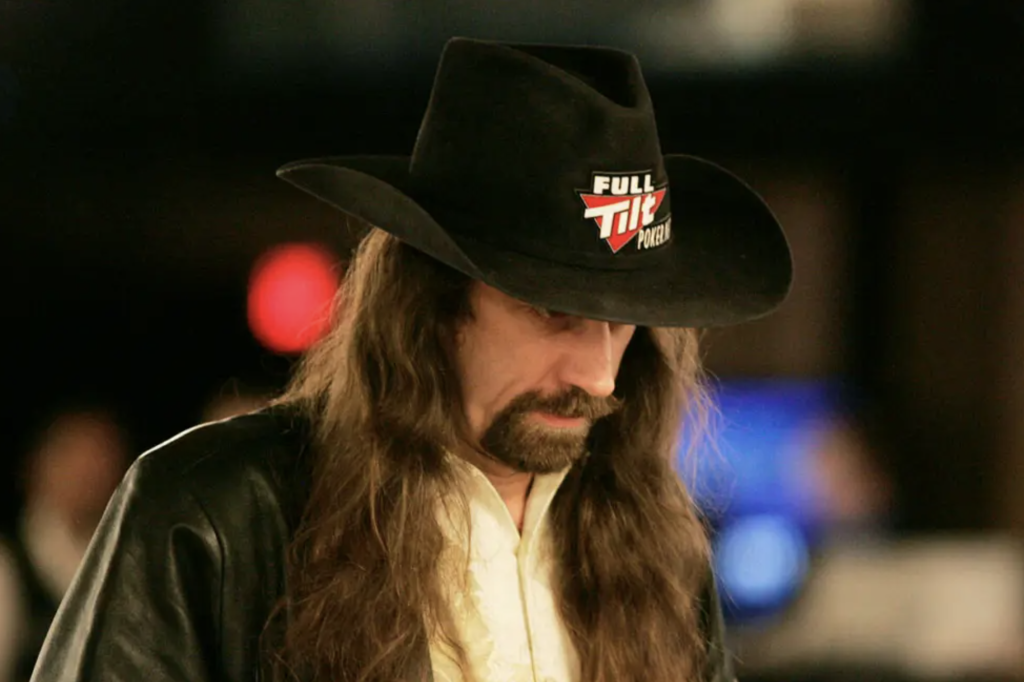
Chris Ferguson’s poker career is one of great ascent and even greater downfall. It’s hard to find someone whose universal adoration turned into such intense animosity in the poker history.
Chris Ferguson was born in 1963 into a family of mathematicians. Following in his parents’ footsteps, he earned his Ph.D. in algorithms for virtual networks in 1999.
Ferguson learned to play poker back in school. His first ITM live dates back to 1993. He began playing online in 1994, when there were no regular poker rooms yet, and the game was played with play money chips in IRC chat protocols.
Chris Ferguson won the WSOP Main Event ($1.5M) in 2000 and later became one of the founders of Full Tilt Poker.
But after the events of “Black Friday” on April 15, 2011, Full Tilt went bankrupt, players’ accounts were frozen, and the founders of the room were charged with organizing illegal gambling and money laundering. The U.S. Department of Justice accused Ferguson and other board members of embezzling $440 million, as well as operating a financial pyramid scheme similar to a “Ponzi scheme.”
Chris Ferguson disappeared from the radar and remained out of the public eye for a long time. Only in 2016 did he reappear in offline events. Then, at the WSOP 2017, he became the series’ top player, cashing in 17 times.
Chris Ferguson released a 42-second video in 2018 expressing regret for the events of “Black Friday” and apologizing for the long wait for payouts. When Full Tilt was acquired by PokerStars, the money was returned to the players.
The last time Chris Ferguson appeared offline was in 2020.
2001: Carlos Mortensen
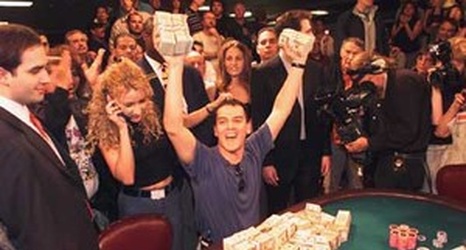
Carlos “El Matador” Mortensen became the first representative of South America (Ecuador) to win the WSOP Main Event ($1.5M). He continued his game and amassed $12M in prize money, including winning two more WSOP bracelets and three major WPT tournaments.
Carlos Mortensen’s last ITM live is dated back to 2017. He hasn’t shown any activity on social media since 2020. Rumors circulating on the 2+2 forum suggest that Mortensen is bankrupt.
2002: Robert Varkonyi — one of the most humble WSOP Champions
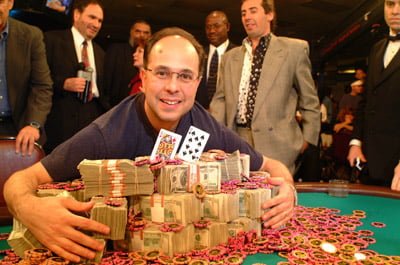
One of the most humble WSOP champions.
Before getting into poker, Robert Varkonyi graduated from the Massachusetts Institute of Technology (MIT) and worked as an investment banker.
Prior to his victory in the 2002 Main Event ($2M), he didn’t have a single live ITM.
Interesting fact about Varkonyi’s victory
Varkonyi knocked out Hellmuth from the Main Event. Then, Hellmuth went to the commentary booth and bet that he would be ready to shave his head if Varkonyi won the tournament.
In the end, Hellmuth kept his word. Varkonyi shaved the first lock of his hair, and then Becky Binion took over. Hellmuth auctioned his hair and eventually bought it himself for $10K, which he donated to charity.
Robert Varkonyi still plays as an amateur. At the WSOP in 2022, he cashed in twice.
2003: Chris Moneymaker — one of the greatest WSOP Champions
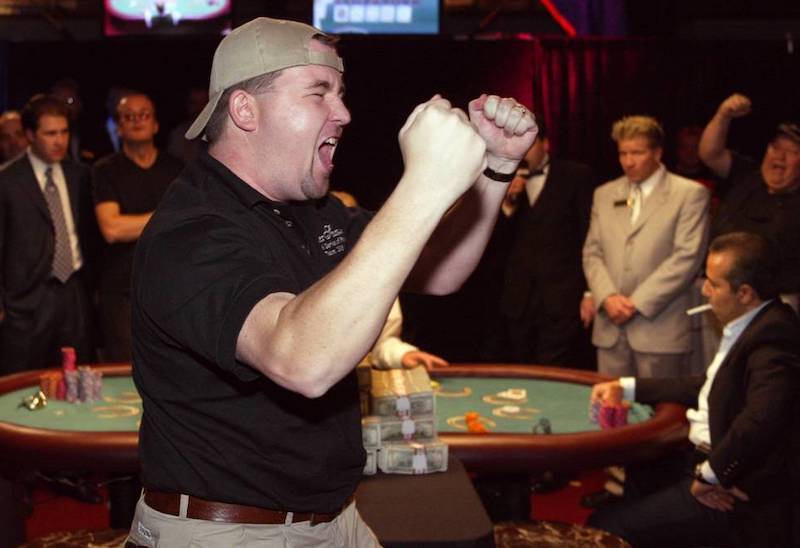
Chris Moneymaker sparked a poker boom with his victory at the WSOP Main Event and secured a ticket to a happy life. He continues to play for fun both online (as an ambassador for the Winning Poker Network) and offline. Recently, he also appeared in the documentary film “Dreamers: A New-Age Poker Documentary with Moneymaker, Konnikova, Elias, Berkey, Rampage and more”. Chris Moneymaker finished 6th in $2,650 The Venom $12,5M GTD for $382K in 2024.
2004: Greg Raymer
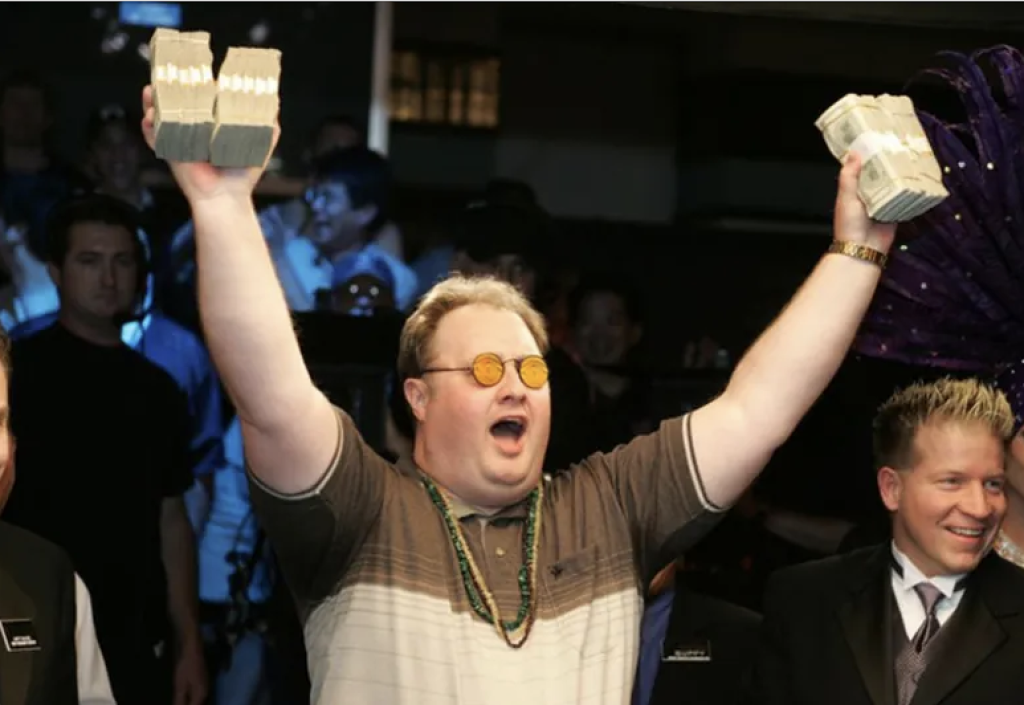
Before getting into poker, Greg Raymer earned two advanced degrees: one in biochemistry and another in law, and he worked for 10 years at the pharmaceutical company Pfizer.
Raymer earned the nickname “Fossilman” because of his hobby of collecting fossils and minerals. He even uses one of his specimens as a card protector.
After winning the WSOP Main Event in 2004 ($5M), Greg Raymer immersed himself in the world of poker. He continues to play in tournaments and contributes to CardPlayer.
In 2013, Greg Raymer was involved in a scandal. He and five other individuals were arrested on suspicion of soliciting a prostitute. Raymer was released on bail and had to complete 75 hours of community service and undergo psychotherapeutic treatment.
2005: Joe Hachem
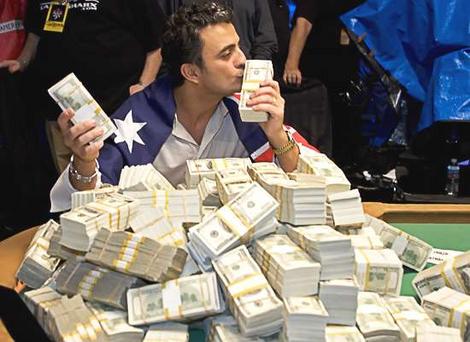
Joe Hachem became the first player from Australia to win the WSOP Main Event ($7.5M). Before getting into poker, he practiced chiropractic medicine, but he had to leave the medical field due to a strange illness. Hachem continues to play to this day.
2006: Jamie Gold
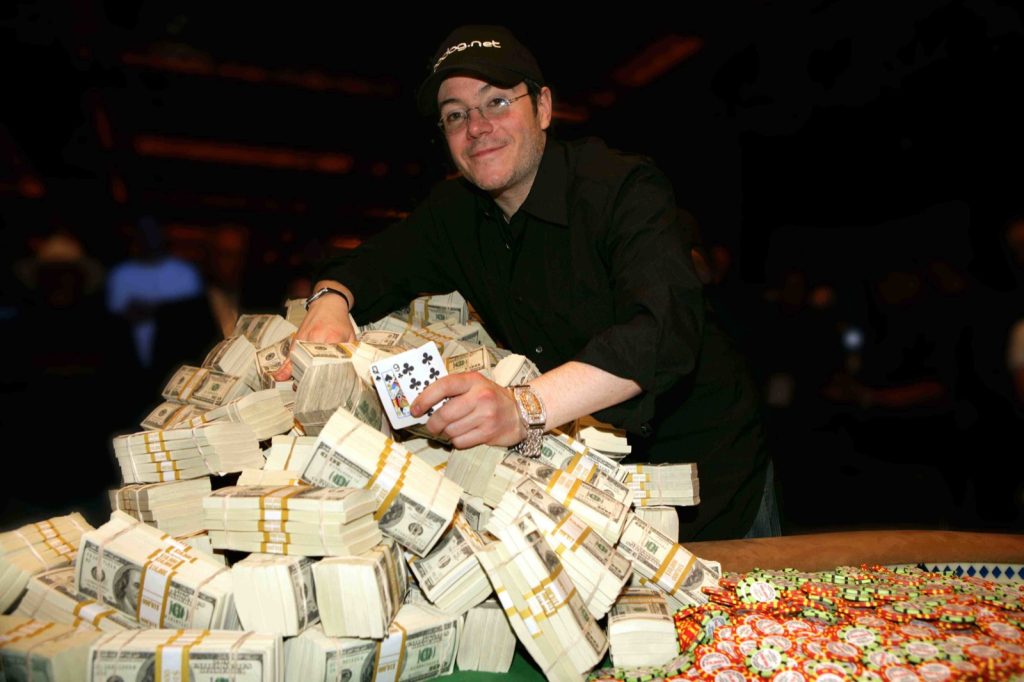
Jamie Gold is the holder of the largest prize in the history of the WSOP Main Event ($12M — it was the biggest prize until 2023). Before getting into poker, he worked in talent scouting in Hollywood. Jamie Gold introduced the world to Jimmy Fallon and James Gandolfini. After winning the WSOP, Gold was forced to give a portion of his winnings to a noname.
2007: Jerry Yang
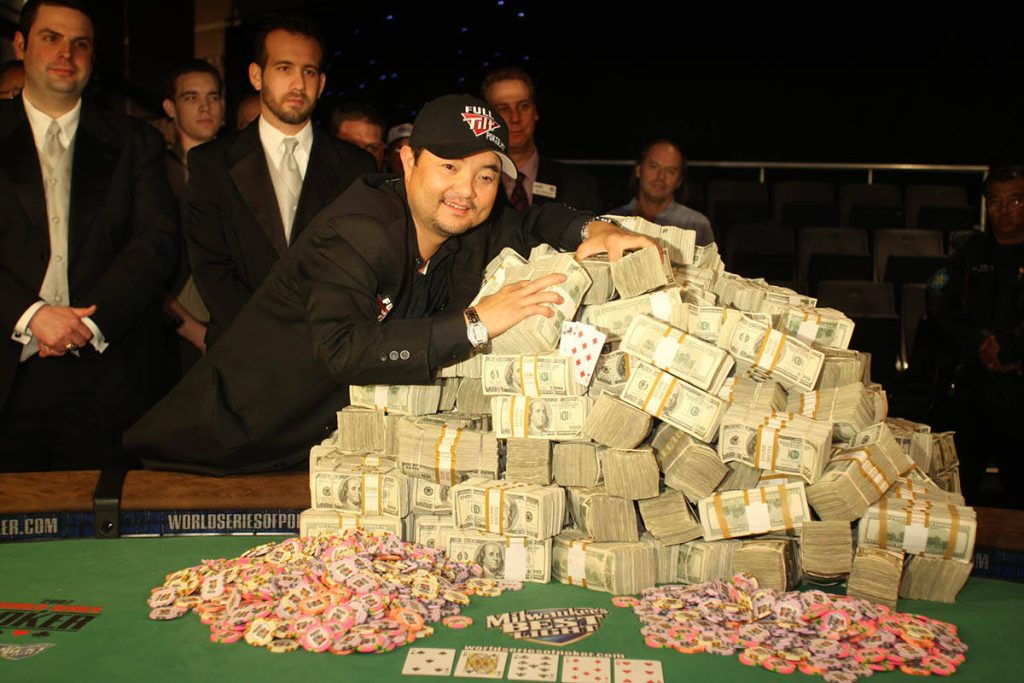
In childhood, Jerry Yang, like Scotty Nguyen and Men Nguyen, fled Vietnam with his family when the communists came to power. He spent four years in a refugee camp in Thailand (where his brother and sister died).
Jerry Yang qualified for the main event through a $225 satellite. He wasn’t a professional player:
I had only one chance to win — to take risks and be aggressive in every hand. I carefully studied my opponents. As soon as I felt weakness, I took risks: raised, re-raised, went all-in. Thank God, a couple of times I got good cards at the right time.
Jerry Yang donated 10% of his winnings to charity. With the money he won, he opened the Pocket 8’s Sushi and Grill restaurant in Merced (which is still operating) — this restaurant has been awarded “Best Restaurant in Merced County” and “Best Japanese Restaurant.”
In 2013, Jerry Yang was charged with tax evasion. To pay off the debt, his WSOP 2007 bracelet, Corum watch (also awarded for his victory), and several other expensive jewelry pieces and watches were put up for auction. Rumor has it that the bracelet was sold to a collector for $30K. For comparison: Jamie Gold sold his bracelet for $60K, and Peter Eastgate’s went for $150K.
Yang continued to play occasionally until 2016, then took a break, but returned to poker in 2022.
2008: Peter Eastgate — lives WSOP Champions’ “boring” life
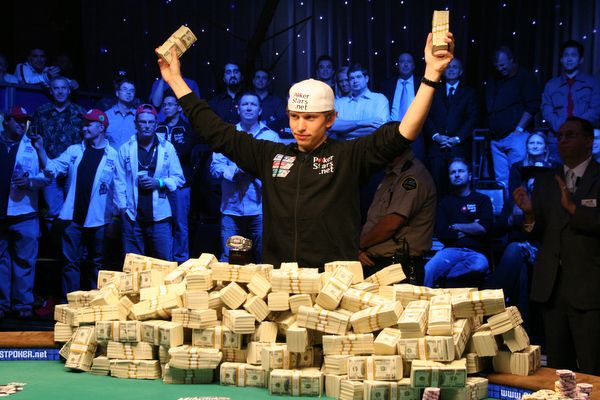
Peter Eastgate became a poker ambassador by chance.
He qualified for the WSOP Main Event through a satellite on Ladbrokes Poker and then won the bracelet ($9.1M), becoming the youngest Main Event champion at 22 years old. Later, he was signed by PokerStars.
But Eastgate himself never wanted to be in the spotlight. In 2013, he disappeared completely from public view. Then, in 2018, he emerged from the shadows and gave an interview to ESPN.
It’s no secret that I’m quite introverted. I’ve always felt nervous in public, and I don’t like giving interviews.
I lost $2.2M in sports betting and decided to leave the gambling industry for good. Poker and betting greatly affect my emotional state.
I performed well in live tournaments, but I was completely unsuitable for online play. Everyone played much better than me. Online, I always felt out of my league.
Eastgate also explained why he sold his bracelet:
It was just lying in a drawer collecting dust. I never touched it. I don’t understand people who told me I should keep the bracelet. For me, it was just a trophy gathering dust. I have the right to do whatever I want with it. Selling the bracelet is not a sign of disrespect to the industry or the community. I don’t keep trophies just because other people think it’s the right thing to do.
I don’t understand the value of jewelry. I understand that the bracelet evokes emotions in other people. But its monetary value was important to me. Obviously, it wasn’t worth the money it was sold for. But I’m glad William Haughey was willing to spend that money, which went to charity.
In 2013, Eastgate studied to become an engineer but failed all four exams. He then tried to become a school teacher but realized it wasn’t for him. Now Peter Eastgate simply lives a peaceful life in Denmark.
I never aspired to live extravagantly. I’m still financially independent. My expenses are insignificant. If I continue spending money at this rate, I could live another 200 years.
From the outside, it seems like I’m living a boring life. But that’s not true. I’m not depressed and I’m content with everything. Every day I walk for 3-4 hours and socialize with friends.
I’m very unproductive. Every day is like Sunday for me. But I don’t plan to live my whole life like this. I would like to be in a situation where I could develop and change something.
Overall, I appreciate what poker has given me. And I just enjoy life.

